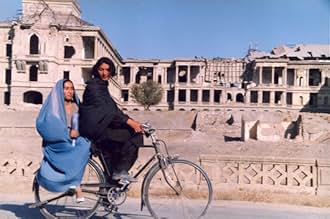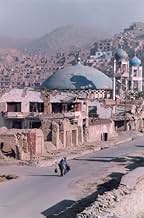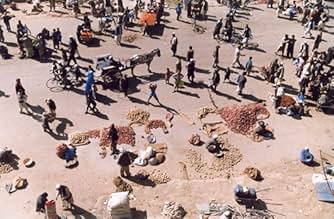ÉVALUATION IMDb
6,8/10
1,6 k
MA NOTE
Ajouter une intrigue dans votre langueIn a post-Taliban Afghanistan a young woman (Agheleh Rezaie) attends school against her conservative father's will, hoping to learn more about democracy to fulfill her dream of being the cou... Tout lireIn a post-Taliban Afghanistan a young woman (Agheleh Rezaie) attends school against her conservative father's will, hoping to learn more about democracy to fulfill her dream of being the country's next president.In a post-Taliban Afghanistan a young woman (Agheleh Rezaie) attends school against her conservative father's will, hoping to learn more about democracy to fulfill her dream of being the country's next president.
- Director
- Writers
- Stars
- Prix
- 4 victoires et 2 nominations au total
Avis en vedette
In "At Five in the Afternoon", we follow the fortunes of a young woman in Afghanistan and her family. Nogreh is caught between two worlds. On the one hand, she attends a school where the teacher encourages girls to become doctors, engineers and even President. At the same time, Nogreh must wait until she steps out of her father's home before she lifts the veil of her burka and trades flat-soled shoes for high heels.
Nogreh is a very idealistic and ambitious young woman who emulates Benazir Bhutto of Pakistan and dreams of being President of her own country some day. Yet she has been kept in a state of childlike naivety and ignorance about politics at home and abroad, due to the teachings of the Koran, Shariah (Islamic law) and the Taliban.
It is exciting to hear the young girls debate the status of women in their country. But the film is also sympathetic and understanding toward the old Afghanistan, symbolized by Nogreh's father. He bewails that "Blasphemy has overrun the city" and the world, as he knew it, has ceased to exist. To add pathos to the situation, he feels he can confide his feelings only to a dumb animal -- his donkey, who "knows nothing but hay".
The film's title echoes a recurring verse from Federico Garcia Lorca's poem, "Lament for Ignacio Sanchez Mejia", about the goring of a bullfighter. Like Lorca's poem, "At Five in the Afternoon" is clouded over by a somber atmosphere of tragedy, death and despair. Yet the film remains remarkable for its astonishingly hopeful -- and indeed radical and revolutionary -- vision of hope for Afghanistan and indeed all of the Arab world.
Nogreh is a very idealistic and ambitious young woman who emulates Benazir Bhutto of Pakistan and dreams of being President of her own country some day. Yet she has been kept in a state of childlike naivety and ignorance about politics at home and abroad, due to the teachings of the Koran, Shariah (Islamic law) and the Taliban.
It is exciting to hear the young girls debate the status of women in their country. But the film is also sympathetic and understanding toward the old Afghanistan, symbolized by Nogreh's father. He bewails that "Blasphemy has overrun the city" and the world, as he knew it, has ceased to exist. To add pathos to the situation, he feels he can confide his feelings only to a dumb animal -- his donkey, who "knows nothing but hay".
The film's title echoes a recurring verse from Federico Garcia Lorca's poem, "Lament for Ignacio Sanchez Mejia", about the goring of a bullfighter. Like Lorca's poem, "At Five in the Afternoon" is clouded over by a somber atmosphere of tragedy, death and despair. Yet the film remains remarkable for its astonishingly hopeful -- and indeed radical and revolutionary -- vision of hope for Afghanistan and indeed all of the Arab world.
Having loved 'The Apple' I was very much looking forward to seeing this, and though it has some very sad and beautiful moments as a whole I thought it lacked a sense of purpose. Having just seen the marvellous 'Osama', although perhaps a little unfair to compare it, that was more straight forward and had a far more emotional pull. The director does get amazing performances from the non-acting cast but occasionally the lack of experience does tell and you sense their just repeating what they've been told to say without really knowing why. It also felt a bit too long and would have been better without some scenes which were too similar to others. Not as good a film as 'The Apple' but worth seeing as there are some nice moments and it still manages to have a sense of humour despite the obvious terrible hardship these people have endured. (6/10)
Was not the sanction against Taliban led by the US to bring dawn into Afghanistan? Noqreh goes back and forth between her father, who believes neither education nor jobs are necessary for women, and the school, where teachers encourage female students to have any job, even the president.
Her family generously offers the place they live to the refugees coming back from Pakistan. Soon they have to go out from there, and without food, the dream of becoming the president fades out. Her white shoes become useless.
It seems the whole of the movie is a poem. That a high school girl dreams to become the president is a poem too. Maybe it is the best way to describe the world Noqreh lives in, which is at five in the afternoon, not in the morning.
How can the country, where just seeing the face of woman is sin, be open to the world? The country which was destroyed and lagged a long way behind the world by men, who are taught as superior creatures than women. Only the belief that God never dies supports them. Tough I have my belief as a Christian, I never want to shut myself away into the world of illusion.
Her family generously offers the place they live to the refugees coming back from Pakistan. Soon they have to go out from there, and without food, the dream of becoming the president fades out. Her white shoes become useless.
It seems the whole of the movie is a poem. That a high school girl dreams to become the president is a poem too. Maybe it is the best way to describe the world Noqreh lives in, which is at five in the afternoon, not in the morning.
How can the country, where just seeing the face of woman is sin, be open to the world? The country which was destroyed and lagged a long way behind the world by men, who are taught as superior creatures than women. Only the belief that God never dies supports them. Tough I have my belief as a Christian, I never want to shut myself away into the world of illusion.
The movie title, and one of its main axis, comes after a fragment of a poem written by Spanish poet Federico Garcia Lorca, called 'Llanto por la muerte de Ignacio Sánchez Mejías', dedicated to the death in 1934 of a Spanish Torero.
This poem is often seen as a premonition of Garcia Lorca's own dead, near Fuente Grande, and of the Civil War that was soon to desolate Spain.
Samira Makhmalbaf comes again with an anguishing tale of a woman that wants to believe in the role of women in a modern society while her own family is disintegrating around her.
This poem is often seen as a premonition of Garcia Lorca's own dead, near Fuente Grande, and of the Civil War that was soon to desolate Spain.
Samira Makhmalbaf comes again with an anguishing tale of a woman that wants to believe in the role of women in a modern society while her own family is disintegrating around her.
Nogreh (Agheleh Rezaie) is a young woman living in a post-Taliban Afghanistan. She ultimately seeks to be educated, and finds solace in a girl school promoting new ideals and attitudes to women. Even though the Taliban have been defeated in the country, old ways are still present and burqa's are still preferred. She lives with her Conservative father and her sister-in-law Leylomah, who is searching for her missing husband who has not returned from war. Also, Leylomah has a baby who she is struggling to feed after her milk dries up. Amongst these struggles, Nogreh is running for class president and uses a Pakistani refugee to help with her ultimate goal which is to become President of Afghanistan.
The title comes from Federico Garcia Lorca's poem Lament for Ignacio Sanchez Mejias, which tells the story of a famous bullfighter tragically coming to an end in the ring. It is repeated several times by the Pakistani character named 'Poet' (Razi Mohebi). Mejias was a real and popular figure in Spain, who returned to bullfighting after a long spell out only to be killed. The character of Nogreh has high hopes after Afghanistan is rejuvinated only to be disappointed by a country set in its ways. Although it is clearly an improvement, attitudes to women are still the same and are seen as the inferior sex. This is most evident in the scene where she poses for photographs which she plans to use in her class president campaign, only to have the photographer laugh in her face upon discovering she wants to eventually run for President of the country. While Lorca's poem is tragic and romantic, At Five in the Afternoon is observant and naturalistic.
It would be easy, given the recent history of Afghanistan, to weave a tale of despair and woe, but director Samira Makhmalbaf tells a story that is full of hope. This hope comes from the character of Nogreh, who is brilliantly portrayed by Rezaie. Although she is ultimately looked down upon, and is scared of her father finding out about her radical attitudes, she is determined, and represents Makhmalbaf's hope of a new generation of women that will rise up and compete against the men who have dominated the country for years, and have ultimately led to the deaths of thousands of its inhabitants and many wars. The underlying messages aren't rubbed in your face; they are instead laid out in real situations. The film won Jury Prize at Cannes, and is a shining light in what will hopefully become a New Wave in Middle Eastern film-making - God knows they have stories to tell.
www.the-wrath-of-blog.blogspot.com
The title comes from Federico Garcia Lorca's poem Lament for Ignacio Sanchez Mejias, which tells the story of a famous bullfighter tragically coming to an end in the ring. It is repeated several times by the Pakistani character named 'Poet' (Razi Mohebi). Mejias was a real and popular figure in Spain, who returned to bullfighting after a long spell out only to be killed. The character of Nogreh has high hopes after Afghanistan is rejuvinated only to be disappointed by a country set in its ways. Although it is clearly an improvement, attitudes to women are still the same and are seen as the inferior sex. This is most evident in the scene where she poses for photographs which she plans to use in her class president campaign, only to have the photographer laugh in her face upon discovering she wants to eventually run for President of the country. While Lorca's poem is tragic and romantic, At Five in the Afternoon is observant and naturalistic.
It would be easy, given the recent history of Afghanistan, to weave a tale of despair and woe, but director Samira Makhmalbaf tells a story that is full of hope. This hope comes from the character of Nogreh, who is brilliantly portrayed by Rezaie. Although she is ultimately looked down upon, and is scared of her father finding out about her radical attitudes, she is determined, and represents Makhmalbaf's hope of a new generation of women that will rise up and compete against the men who have dominated the country for years, and have ultimately led to the deaths of thousands of its inhabitants and many wars. The underlying messages aren't rubbed in your face; they are instead laid out in real situations. The film won Jury Prize at Cannes, and is a shining light in what will hopefully become a New Wave in Middle Eastern film-making - God knows they have stories to tell.
www.the-wrath-of-blog.blogspot.com
Le saviez-vous
- AnecdotesSamira Makhmalbaf had difficulty casting the lead role of Nogreh because many women refused to appear on camera without their burqa. Agheleh Rezaie was her second choice after the initial woman she cast dropped out after Makhmalbaf said she would have to show her face to the camera.
- ConnexionsFeatured in Lezate divanegi (2003)
Meilleurs choix
Connectez-vous pour évaluer et surveiller les recommandations personnalisées
Détails
Box-office
- Brut – à l'échelle mondiale
- 515 144 $ US
Contribuer à cette page
Suggérer une modification ou ajouter du contenu manquant

Lacune principale
By what name was À cinq heures de l'après-midi (2003) officially released in India in English?
Répondre


















